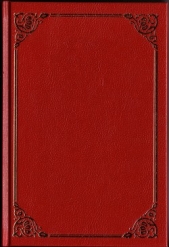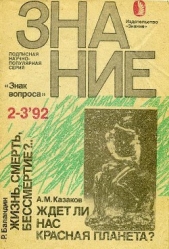Психология критического мышления

Психология критического мышления читать книгу онлайн
Эта книга написана в помощь тем, кто хочет научиться думать современно. Опираясь на новейшие достижения когнитивной психологии и свой уникальный педагогический опыт, Дайана Халперн разработала эффективную программу обучения навыкам «критического мышления». Данная книга может быть широко использована в преподавательской и методической работе, окажет неоценимую помощь в самообразовании, а кроме того, является своеобразным путеводителем по современной когнитивной психологии. Рекомендуется психологам, педагогам, философам, а также всем интересующимся когнитивной психологией, психологией творчества, теорией принятия решений.
Внимание! Книга может содержать контент только для совершеннолетних. Для несовершеннолетних чтение данного контента СТРОГО ЗАПРЕЩЕНО! Если в книге присутствует наличие пропаганды ЛГБТ и другого, запрещенного контента - просьба написать на почту [email protected] для удаления материала
Facione P. (1991, August). Teaching college-level critical thinking skills. Paper presented at the 11th Annual International Conference on Critical Thinking and Educational Reform, Sonoma, CA.
Ferguson G. (1981). Architecture. In N. L. Smith (Ed.). Metaphors for evolution: Soureces of new methods. Beverly Hills, CA: Sage.
Festinger L. (Ed.). (1964). Conflict, decision and dissonance. Palo Alto, CA: Stanford University Press.
Festinger I., Riecken И. W., Schacter, S. (1956). When prophecy fails. Minneapolis: University of Minnesota Press.
Feyerabend P. (1975). Against method. London: Verso.
Feynman R. (1989). What do you care what other people think? New York: Bantam.
Finke R. A., Ward Т. В., Smith S. M. (1992). Creative cognition: Theory, research, and applications. Cambridge, MA: Bradford.
Fischer G. W., Johnson E. J. (1986). Behavioral decision theory and political decision making. In R. R. Lau D. O. Soars (Eds.), The 19th Annual Carnegie Symposium on Cognition: Political Cognition (pp 55-65) Hillsdale, NJ: Lawrence Erlbaum Associates.
Fischoff B. (1975). Hindsight^foresight: The effect of outcome knowledge on Judgment under uncertainty. Journal of Experimental Psychology: Human Perception and Performance, 1, 288-299.
Fischhoff B. (1993, March/April). Controversies over risk: Psychological perspective on competence. Psychological Science Agenda, 6, 8-9.
Fischoff В., Lichtenstein S., Slouic P., Derby S. L, Keeney R. L. (1981). Acceptable risk. Cambridge, England: Cambridge University Press.
Fisher R., Ury W. (1991). Getting to «yes»: Negotiating agreement without giving in (2nd ed.). New York: Penguin.
Fiske S. T. (1993). Controlling other people: The impact of power on stereotyping. American Psychologist, 48, 621-628.
Fiske S. T, Taylor S. E. (1984). Social cognition. New York: Random House. Fixx J F. (1978). Solve it. New York: Doubleday
Flesph /?. (1951). The art of clear thinking. New York: Harper Row.
Fogelin R. J. (1987). Understanding arguments, an introduction to informal logic (3rd ed.). New York: Harcourt Brace.
Fong G. Т., Krantz D., Nisbett R. E. (1986). The effects of statistical training on thinking about everyday problems. Cognitive Psychology, 18, 253-292.
Fong G. Т., Nisbett. R. E. (1991). Immediate and delayed transfer of training effects in statistical reasoning. Journal of Experimental Psychology: Human Leanning and Cognition. 120, 34-45.
Footnotes. (1994, April 20). The Chronicle of Higher Education.
Fox L. S., Marsh G., Crandall Jr., J. С (1983, April 30). The effect of college classroom experiences on formal operational thinking. Paper presented at the 1983 Annual Convention of the Western Psychological Association, San Francisco.
Frammolino R. (1993, December 17). Most college GEDs fail simple tests, study finds. The Los Angeles Times, pp. A41, A43.
Frazier K. (Ed.). (1991). The hundredth monkey and other paradigms of the paranormal. Buffalo, NY: Prometheus.
Friedman S. L., Scholnick E. K., Cocking R. R. (Eds.). (1987). Blueprints for thinking: The role of planning jn cognitive development. Cambridge, MA: Cambridge University Press.
Fruzzetti A. E., Toland K., Teller S. A., Loftus E. A. (1992). Memory and eyewitness testimony. In M. M. Gruneberg and P. E. Morris (Eds.), Aspects of memory: The practical aspects (Vol. 1) 2nd ed. New York: Routledge.
Gardner И. (1982). Art, mind and brain: A cognitive
approach to creativity. New York: Basic Books. Gardner H. (1983). Frames of mind: The theory of multiple intelligences. New York Basic Books. Gardner H. (1985). The mind's new science: A history of the cognitive revolution. New York: Basic Books. Gardner H. (1989). To open minds. New York: Basic
Books.
Gardner H. (1993). Creating minds: An anatomy of creativity seen through the lives of Freud, Einstein, Picasso, Stravinsky, Eliot, Graham, and Gandhi. New York- Basic Books.
GarfieldJ.,Ahlgren,A. (1988). Difficulties in learning basic concepts in probability and statistics: Implications for research. Journal [or Research in Mathematics Education, 19(1), 44-63.
Garnham A., Oakhill J. (1994). Thinking and reasoning. Oxford, England: Blackwe.
Geiselman R. E., Fisher R. P. (1985, December). Interviewing victims and witnesses of crime. Research in Brief, National Institute of justice, 1-4.
Gentner D., Gentner D. R. (1983). Flowing water or teeming crowds: Mental models of electricity. In D. Centner A. L. Stevens (Eds.), Mental models. Hillsdale, NJ: Lawrence Erlbaum Associates.
Gerbner G., Grass L., Morgan M., Signorielli N. (1980). Violence profile No. 11: Trends in network television drama and viewer conceptions of social reality. Philadelphia: Annennberg School of Communication.
Gick M. I., Holyoak K. (1980). Analogical problem solving. Cognitive Psychology, 12, 306-355.
Gifford-Jones W. (1977). What every woman should know about hysterectomy. New York: Funk Wagnalls.
Gilbreth F.B.(963). Cheaper by the dozen. New York: Crowell.
Gilhooly K. J. (1987). Mental modeling: A framework for the study of thinking. In D. N. Perkins, J. Loch-head. J. Bishop (Eds.), Thinking: The second international conference (pp. 19-32). Hillsdale, NJ: Lawrence Erlbaum Associates.
Gillette R. (1987, December 4). Exotic ways to learn doubted by U.S. study. The Wall Street Journal. pp. 1,32.
Gilovich T. (1991). How we know what isn't so: The fallibility of human reason in everyday life. New York: Macmillan.
Glaser R. (1984). Education and thinking: The role of knowledge. American Psychologist, 39,93-104.
Glaser R. (1992). Expert knowledge and processes of thinking. In D. F. Halpern (Ed.), Enhancing thinking skills in the sciences and mathematics (pp. 63-76). Hillsdale, NJ: Lawrence Erlbaum Associates.
Glucksberg S., Weisberg R. W. (1966). Verbal behavior and problem solving: Some effects of labeling in a functional fixedness problem. Journal of Experimental Psychology, 71, 659-664.
Goleman D., Kaufman P., Ray M. (1993). The creative spirit. New York: Penguin.
Gordon W. J. J. (1961). Synectics. New York: Harper Row.
Gordon W. J. J. (1976). Metaphor and invention. In A. Rothenberg С R. Hausman (Eds.), The creativity Question. Durham, NC: Duke University Press.
Govier T. (1985). A practical study of argument. Bel-mont, CA: Wadsworth.
Gray W. (1991). Thinking critically about new age ideas. Belmont. CA: Wadsworth.
Greeno J. G. (1973). The structure of memory and the process of solving problems. In R. L. Solso (Ed.), Contemporary issues in cognitive psychology. Washington DC: Winston.
Greeno J. G. (1992). Mathematical and scientific thinking in classrooms and other situations. In D. F, Halp-ern (Ed.), Enhancing thinking skills in the sciences and mathematics (pp. 39-62). Hillsdale, NJ: Lawrence Erlbaum Associates.
Griffiths D.HAl976). Physics teaching: Does it hinder intellectual development? American Journal of Physics, 44, 81-85.
Gruneberg M., Morris P. (Eds.), (1992). Aspects of memory; The practical aspects. (Vol. 1) 2nd. ed. New York: Routledge.
Cuilford J. P. (1977). Way beyond the IQ. Buffalo, NY: Creative Education Foundation.
Gunther M. (1977). The luck factor. New York: Mac-millan. Hadamard, J. (1954). The psychology of invention in the mathematical field. Princeton, NJ: Princeton University Press.

























